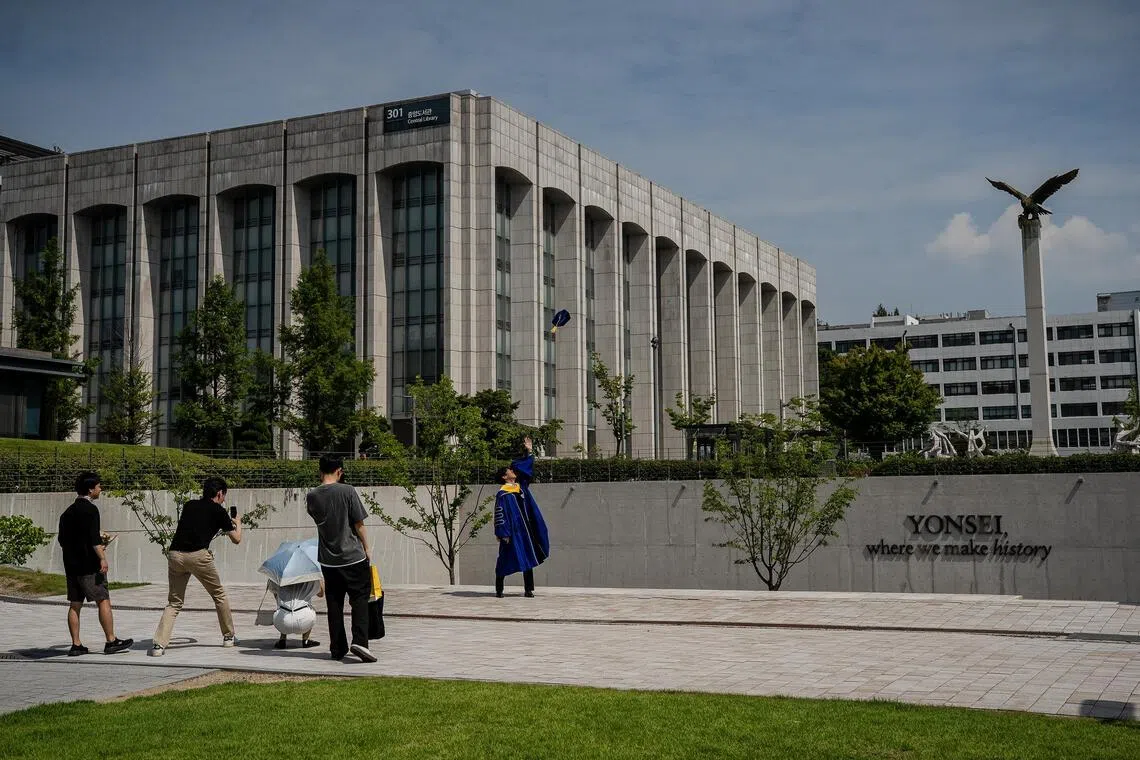More South Korean students putting off graduation, choosing universities outside Seoul
Sign up now: Get ST's newsletters delivered to your inbox

A graduate tosses his cap at Yonsei University in Seoul on Aug 1.
PHOTO: TINA HSU/NYTIMES
Follow topic:
SEOUL - A growing number of South Korean university students are postponing graduation, reflecting growing anxiety over entering a weak job market.
As of September, more than 9,000 students at nine major regional universities and six leading private universities in Seoul have deferred graduation, according to data released by Representative Jin Sun-mi of the Democratic Party.
The figure is up nearly 50 per cent from 2022
Graduation deferrals, which local students often call a “voluntary fifth year”, allow students who have already met their degree requirements to remain enrolled for an additional semester or year, typically by paying between 100,000 won (S$89) and 200,000 won.
Students say remaining “in school” gives them better access to internships, as well as recruiting information, especially as companies increasingly opt for year-round hiring instead of large-scale recruitment drives.
“Companies want candidates with a wide range of skills, and it’s easier to prepare for that as a current student than as an unemployed graduate,” said 24-year-old Choi Seung-hee, a student who chose to delay graduation.
The trend is widespread, especially among students outside the capital area.
At Pusan National University, the number of deferrals hit 589 in 2025, up 36 per cent and the highest in four years.
Across Busan’s major universities, including Pusan National, Dong-A and Pukyong National, more than 1,800 students deferred graduation in 2025, with up to 13 per cent of would-be graduates at some campuses opting to stay enrolled.
Gangwon province shows a similar pattern, with graduation deferrals rising 51 per cent over three years to 647 students in 2025.
The reason for this reluctance to graduate is a lack of employment opportunities.
The number of job openings per applicant, measured by the Labour Ministry’s “job-offer ratio”, declined to 0.42 in October, the lowest for that month since 1998, the year after the Asian financial crisis, when the rate fell to 0.19.
Experts warn the delays reflect the severity of the youth job crisis and could widen regional economic disparities.
“Delays in young people entering society later harm local economies and drag down the country’s long-term growth potential,” said Professor Kim Jae-hoon, who teaches sociology at Kangwon National University.
At the same time, university application data suggests a gradual shift away from the long-established trend of concentrating educational and career ambitions
According to university admissions platform Jinhaksa, the share of students applying to Seoul-based universities for the 2026 admissions cycle dropped sharply to 18.8 per cent, down five percentage points from 2024. This is the lowest since a major revamping of the College Scholastic Ability Test in 2022.
The ratio had steadily risen over the past four years, with 22.2 per cent of students applying for universities in Seoul in 2022, 23.6 per cent in 2024, 23.8 per cent in 2025, before plunging below the 20 per cent level.
Meanwhile, applications to universities outside the capital instead increased across nearly all regions.
Applications from capital-area students to universities in the Chungcheong and Gangwon provinces rose markedly, while students outside the capital area more frequently selected institutions within their home regions.
Experts point to the growing trend of students prioritising lower living costs, better odds of admission, and an expansion of special admission tracks for local students.
“Many students are avoiding the intense competition in Seoul and choosing regional universities strategically,” said Mr Woo Yeon-cheol, head of the Jinhaksa Admissions Strategy Research Institute.
“An increase in the number of test-takers this year pushed more students toward safer choices. And this trend is expected to continue into the regular admissions round,” he noted. THE KOREA HERALD/ASIA NEWS NETWORK

